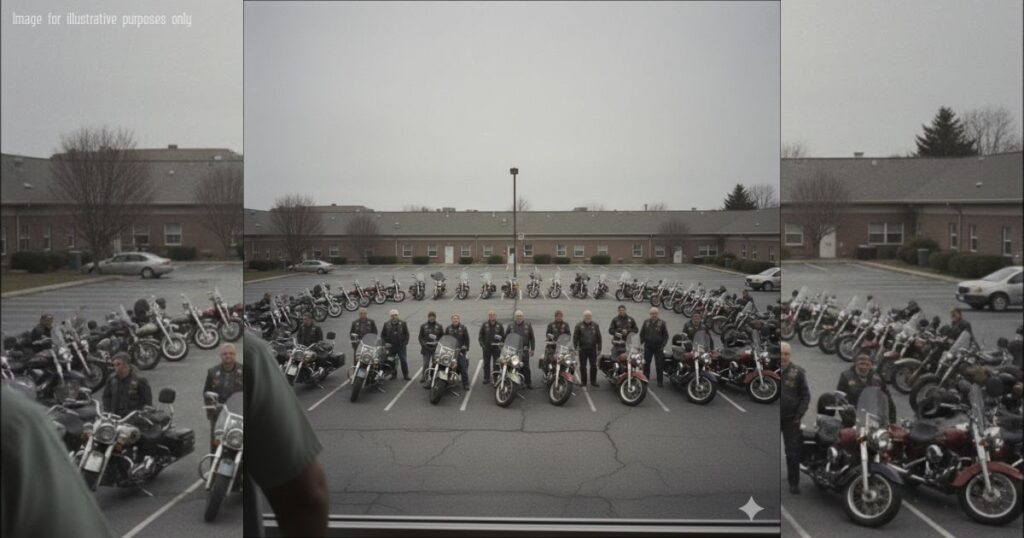I pulled out my phone.
On the screen, I had the old screenshots I’d saved months ago.
“This is Jack leading a charity ride,” I said, holding it up.
“This is Jack organizing relief after a storm. This is Jack receiving an award for mentoring teens at a community center.”
“He is who he says he is,” I finished.
“You’ve been medicating the parts of him that don’t fit your paperwork.”
A biker with a faded badge clipped to his belt stepped forward.
“Retired officer,” he said. “If this gentleman can tell me who he is, where he is, and what he wants, you can’t keep him here by force.”
Tyler, the one with the phone, turned the camera toward Jack.
“Saint,” he said. “You don’t owe anybody a performance. Just answer honest. Where are you?”
Jack took a long breath.
“In a building that calls itself care and feels like waiting,” he said slowly. “In a room that isn’t mine, stuck between four beige walls.”
“What do you want?” the retired officer asked.
“Not what your son wants. What do you want?”
Jack looked at me.
My throat tightened.
“I want to ride once more with my brothers,” he said. “If that’s my last trip, it beats dying staring at ceiling tiles.”
The hallway monitors kept beeping.
Somewhere downstairs, a phone was ringing off the hook.
One of the security guards stepped back.
“I’m not dragging an eighty-four-year-old vet away from his friends on live video,” he muttered. “No thanks.”
Red bent to the bottom drawer of Jack’s dresser.
He pulled out the leather vest I’d helped hide when policy called it “inappropriate.”
It was soft with age, heavy with patches.
When I slid it over Jack’s thin shoulders, he straightened almost an inch.
For a heartbeat he didn’t look like a patient.
He looked like the man from those old photos, just a little more used to carrying weight.
“Let’s go home, Saint,” Red murmured.
“Road’s waiting.”
They wheeled him down the hall, monitor cord dangling uselessly.
Residents clapped, some laughed, some cried.
“Ride for me too!” someone called.
“Tell them we’re still here!” another voice said, and I had to blink hard.
Outside, the air tasted like cold metal and freedom.
The bikes idled in formation, chrome and rust and real miles.
They hadn’t brought fantasy.
They’d brought a modified cruiser with rails and a deep seat, built so an unsteady man could ride safely in the center of his people.
Jack wrapped his hands around the bars.
The tremor in his fingers seemed to steady.
Tyler pointed the camera at me.
“You’ll get in trouble for this?” he asked.
“I already am,” I said.
“But there’s worse trouble than doing right by someone.”
Jack squeezed my hand.
“Thank you for seeing me,” he murmured. “Not everybody bothers.”
“You were never just Room 214,” I said.
“You’re Jack Donovan. Don’t let anyone forget it again.”
Red started his engine.
One by one the others followed, the sound rolling through my chest like a different kind of heartbeat.
They pulled out together, traffic pausing as the line merged.
Jack sat tall in the center, vest catching the weak sun, face turned into the wind.
Jack didn’t die that day.
He didn’t die that month.
The video Tyler posted traveled faster than any ambulance.
Some people were angry, some grateful, some just quietly shared it with a caption asking what we owe the people who built our roads and paid our taxes and then grew old in our blind spots.
There were investigations and trainings about autonomy and dignity.
There were meetings with a lot of words like “optics.”
I left Green Valley before they decided what to do with me.
I found another facility, smaller and poorer, where family pictures cover the walls and we schedule time for stories, not just pills.
Months later, I got a text from an unknown number.
It was a picture of Jack on a porch in a leather vest, surrounded by bikes and grinning men and women, sunset melting behind them.
“He says your coffee was better than ours,” the message read.
“Also, he forgave you for waking him up at 5 a.m. all those times.”
Jack lived another eighteen months in a little rental near a quiet road.
The Riders took turns staying with him, making sure his medicine helped rather than silenced, making sure his door opened onto the world, not just a hallway.
When he finally went, it was in his sleep.
His boots waited by the bed, his vest hung over the chair, his bike parked outside like it would be needed in the morning.
They rode in his honor and used his small savings to start a fund for elders who want something kinder than four locked walls.
They called it the Last Ride Fund.
Sometimes, after my shift at the new place, I drive out toward the highway.
If I’m lucky, I’ll spot a string of bikes on the horizon, engines low, riders older than their leather.
I always slow down.
I think of Jack, of thirty-four motorcycles in a parking lot, of a gray morning that turned one man’s last chapter from beige to bright.
We say the word “freedom” a lot in this country.
Jack spent his final miles proving it still means something when we use it to lift each other up, not just to talk about ourselves.
Thank you so much for reading this story!
I’d really love to hear your comments and thoughts about this story — your feedback is truly valuable and helps us a lot.
Please leave a comment and share this Facebook post to support the author. Every reaction and review makes a big difference!
This story is a work of fiction created for entertainment and inspirational purposes. While it may draw on real-world themes, all characters, names, and events are imagined. Any resemblance to actual people or situations is purely coincidenta


